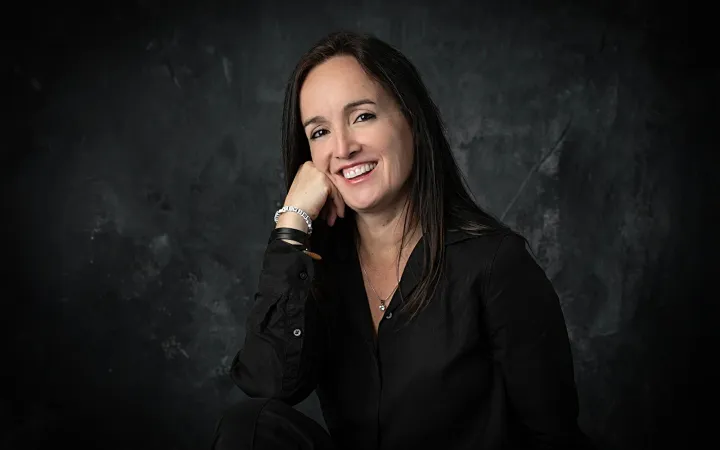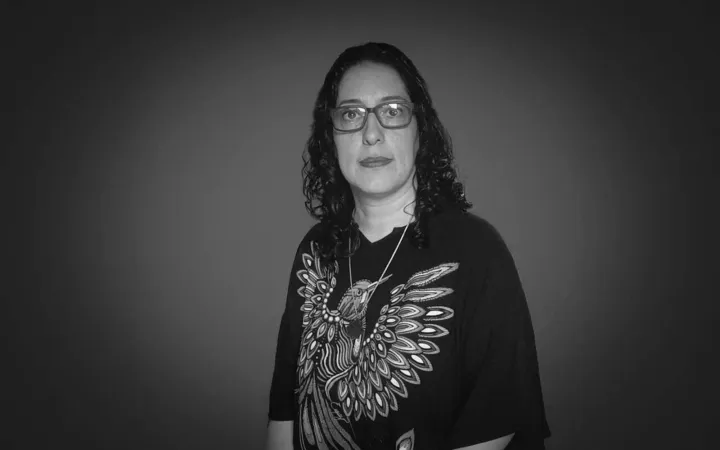
Por Sandra Romandía

Te despiertas a media mañana quizás -ignoras la hora exacta- y tu cuerpo está ahí, inmóvil, simulando casi estar inerte, sobre el colchón inflable semi desinflado, con las sábanas echadas hacia un lado y sintiendo el contacto de la piel con el vinilo aterciopelado del aposento. Sientes la boca seca, pero también los ojos, el cuello, las manos, el pelo, la parte detrás de las orejas, los muslos, las uñas de los pies. Volteas a ver a tu lado izquierdo y te sonríe una botella semivacía de vodka de marca incierta, deduces entonces que a lo mejor se te pasaron las copas cuando ves el vaso de plástico tirado todavía con unos chorros de líquido rojo que seguramente era alguna bebida edulcorada de sobre mezclada con agua y alcohol.
Recuerdas que alguien con quien conversaste la noche anterior te prestó un libro, medio roído y medio húmedo, A Salto de mata, de Paul Auster. Llevas meses de haber llegado a la gran ciudad, la Ciudad de México, procedente del norte del país donde dejaste y vendiste todo: tu auto, tus teléfonos, tu familia, tu ropa, tu vida. No has encontrado trabajo, no era tan fácil como lo ideaste, pero al menos te entretienes una que otra noche conociendo gente y bebiendo; piensas que un día va a sonar el celular o va a llegar el correo que diga que alguna empresa periodística te contrata; alguna mañana, tarde, noche se dará ese suceso que cambiará tu vida. Te levantas arrastrando los pies hacia el baño, luego a la cocina de un departamento en Durango, esquina Jalapa, en la colonia Roma, que no tiene muebles porque te alcanzó para el alquiler pero no para llenarlo; eso vendrá después -te recuerdas al ver la sala que parece una pista de baile- cuando consigas un trabajo, de periodista, de editora, de escritora (tu sueño en la adolescencia), de lo que sea pero que empuje tu creatividad. Después de abrir el refrigerador que está totalmente desolado como una sala de aeropuerto del que el avión partió ves el calendario y caes en cuenta que ya han pasado muchos meses y que el dinero se agota. “Cuando llegué a la treintena, pasé por unos años en los cuales todo lo que tocaba se convertía en fracaso”, leerás esa misma noche de pluma del neoyorkino (en realidad neojerseyino), aunque estás en tus iniciales veintes.
Vuelves a tu recámara que tiene una java como buró y te pones a leer A salto de mata. Habías leído antes a Paul Auster, aquello llamado La invención de la soledad, la obra en la que describe la muerte de su padre y cómo empezó a escribir después de ésta: “No nos queda otra cosa, la irreductible certeza de nuestra mortalidad. Podemos aceptar con resignación la muerte que sobreviene después de una larga enfermedad, e incluso podemos achacarla al destino; pero cuando un hombre muere sin causa aparente, cuando un hombre muere simplemente por es un hombre, nos acerca tanto a la frontera invisible entre la vida y la muerte que no sabemos de qué lado nos encontramos”, dice una de sus frases y sientes un afán irreductible de querer vivir más, como quien como quien respira por primera vez el aire después de una eternidad bajo el agua.
Piensas en todos los libros que te hubiera gustado escribir para entonces, a tus 23 años de edad, pero no tienes ninguno y piensas que quizás cuando tu padre muera iniciarías. Pero tu padre está entonces lejos de morir (dejaría este mundo 15 años después) y te avocas a dedicar el día a vivir la resaca leyendo el libro que te han dejado, además de enviar uno que otro currículum para probar suerte.
Entonces A salto de mata te empieza a despertar los sentidos ocultos, no los usuales, sino la capacidad de imaginar, de trasmutar la existencia del personaje a la tuya, de respirar desde los pulmones de otro, de adoptar las reflexiones del otro. "El escritor no 'elige una profesión', como el que se hace médico o policía. No se trata tanto de escoger como de ser escogido, y una vez que se acepta el hecho de que no se vale para otra cosa, hay que estar preparado para recorrer un largo y penoso camino durante el resto de la vida", lees y te identificas porque sabes que no podrías ser otra cosa que ser periodista y que para salir de eso tendrías que volver a nacer. Pero es la crisis global del 2008-2009 y nadie te contrata, y los "grandes medios" despiden personal en vez de llamar a nuevos, y lo único que te llega de vez en cuando son freelanceos de poca monta. Pero ahí está Auster, diciéndote que todo eso pasa también y que aún cuando te has tenido que habituar a comprar en el mercado de la Merced verduras y vísceras para comer, esa etapa se irá y volverás a los menús tradicionales, con todo y que dentro de ti, como un remolino ingobernable, algo te esté diciendo que quizás te quedes así el resto de tu vida, que quizás nunca saldrás de eso, del departamento sin muebles, de la tensión mes a mes de no poder pagar la renta, del colchón inflable desinflado.
A menudo te preguntabas qué hubiera pasado si siguieras viviendo con tus padres en esa ciudad de provincia, andando la vida sobre altos tacones y cabellos arreglados, faldas voladas a la rodilla y camisas ajustadas ejecutivas bien planchadas, trabajando por un sueldo promedio en un medio de comunicación promedio en una ciudad promedio, llegando a la quincena con limitaciones, como la gente promedio, pero llegando (lo que tampoco está mal). No estando ahí en ese colchón a ras de suelo persiguiendo sueños sin ayuda de nadie. “Creía en mis capacidades, y sin embargo no tenía confianza en mí mismo. Era atrevido y tímido, ágil y torpe, resuelto e impulsivo: un monumento viviente al espíritu de la contradicción. Mi vida acababa de empezar y ya me movía en dos direcciones a la vez”, decía Paul Auster y tú te sentías totalmente identificada. Aunque para ese entonces aún no había escrito 4,3,2,1, si hubiese existido te habrías apropiado de la frase “¿Cuándo llega el gran acontecimiento que desgarra el corazón de las cosas y cambia la vida a todo el mundo, el inolvidable momento en que algo acaba y empieza otra cosa diferente?”. Ese día y los venideros inmediatos no ofrecerán ningún panorama diferente.
Luego pasan los años y te encuentras en un encuentro de colegas internacionales en el que te destacan tu trayectoria, tus logros, tu "legado" como periodista joven. Es la Universidad de Columbia, en Nueva York, esa que viste tan lejana desde la ciudad mexicana norteña y desértica en la que creciste, y te das cuenta que el tiempo ha pasado y el colchón inflable y las vísceras finalmente quedaron atrás. Ahora hay tanto trabajo, eventos, entrevistas que dar, libros por escribir y reportajes por publicar que ya no hay tiempo ni para echarle un telefoneo a tu madre; vives sola con tu perro desde hace años y tus departamentos cada vez van mejorando más. Pasaste antes de uno a otro, de otro a otro más... de vivir en Ciudad de México a Buenos Aires, de Buenos Aires de regreso a la capital mexicana. Viajaste a una treintena de países. Cuentas 10 mudanzas en poco más de 10 años y te das cuenta de que ha pasado la vida y ha valido la pena. No puedes tomarte una botella entera de vodka desde hace años, no hay tiempo para resacas largas, no amaneces sin despertador desde otros más, no sientes el suelo a ras desde aquella mañana de cruda sin un panorama alentador; ya no puedes hacer planes de viajes de mochilera, ni pesas 10 kilos menos debido a la dieta forzada por ahorro que llevabas antes. Ya no le hablas a cualquier extraño en la calle porque pocos son los espacios para andar sola sin prisas ni compromisos.
No concibes vivir sin tener un ahorro en tu cuenta de banco y algunas propiedades como tranquilidad; te sientes segura de hacer lo que haces y de entender aquella frase sobre que la profesión, el periodismo, te eligió a ti y no tú a ella.
“No echas en falta los viejos tiempos. Siempre que te pones nostálgico y empiezas a añorar la pérdida de cosas que parecían hacer la vida mejor de lo que ahora es, te dijese que debes detenerte un momento a pensarlo bien, a examinar el Entonces con el mismo rigor que aplicas al Ahora, y no tardas en llegar a la conclusión de que el Ahora y el Entonces son, en esencia, la misma cosa”, te dice Paul Auster de nuevo ahora en Diario de Invierno, su obra de 2012 en la que hace un recuento de su vida, a sus más de 60 años, y los departamentos en los que ha vivido, todas sus mudanzas.
“Tus pies descalzos en el suelo frío cuando te levantas de la cama y vas a la ventana. Tienes sesenta y cuatro años. Afuera, la atmósfera es gris, casi blanca, no se ve el sol. Te preguntas: ¿Cuántas mañanas quedan? Se ha cerrado una puerta. Otra se ha abierto. Has entrado en el invierno de tu vida", y lees eso y piensas que ese día llegará en cualquier momento y te preguntas qué ha sido provechoso y qué infructuoso.
Pasan otros años y muere tu padre, y no escribes aún nada de ficción de cualquier modo pero recuerdas la frase de La invención de la soledad, “Uno no deja de ansiar el amor de su padre, ni siquiera cuando es adulto”. Y ves siempre mas cerca la muerte aunque a la vez sabes que está lejos, no llegas a la cuarta década de vida.
Todo transcurre y caes en cuenta que por fin has conocido a Auster en persona en una Feria del Libro de Guadalajara, sin saber que años después la vida se pondría aún más interesante y estarías en una misma cena con su esposa en Monterrey y para entonces tendrías publicados cinco libros -coordinados o en coautoría con colegas- y los habrías presentado en innumerables ferias.
Luego vendrá todo lo demás, todo lo que hasta ahora vives y no eres capaz de procesar quizás, pero siempre te acompaña en cada etapa ese escritor newyorkino que se fue demasiado pronto dirían algunos, aunque no, a sus 77 años se fue cargado de historias y buen humor, según diría su esposa sobre sus últimas horas.
“No nos queda otra cosa, la irreductible certeza de nuestra mortalidad. Podemos aceptar con resignación la muerte que sobreviene después de una larga enfermedad, e incluso podemos achacarla al destino; pero cuando un hombre muere sin causa aparente, cuando un hombre muere simplemente porque es un hombre, nos acerca tanto a la frontera invisible entre la vida y la muerte que no sabemos de qué lado nos encontramos”, completaba tu pensamiento Auster en Diario de Invierno.
Y te preguntas cómo dejar ir a alguien que ha vivido tan íntimamente tu historia y con quien a la vez nunca hablaste ni tenías planes de hablar. “Todas las contradicciones son ciertas”, diría él.
Los huecos en el diario de nuestra historia se llenan también de esos adioses que nunca lo fueron pero que de alguna manera estarán ante la imborrable huella de quienes intelectualmente nos llenaron el alma y nos acompañaron los pasos.
Adiós Paul.
Las opiniones expresadas son responsabilidad de sus autoras y son absolutamente independientes a la postura y línea editorial de Opinión 51.





Comments ()